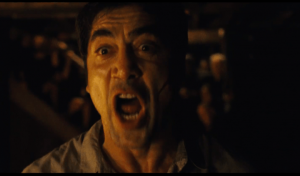The Mirror: How mother! Can Help Us
**WARNING: THE FOLLOWING POST CONTAINS SPOILERS FOR A FILM THAT IS STILL IN THEATRES. READ AT YOUR DESCRETION**
Multiple people and websites spoiled Darren Aronofsky’s mother! for me just as soon as it came out. We’re talking way under 24 hours – they attended a midnight showing and posted their thoughts and feelings – complete with twists and plot spoilers – on social media by 2:30 AM on Friday with nary a hint of the spoilers within. Their justification for this action was the pure rage they felt: it’s a religious allegory! It’s misogynistic! It’s a filmmaker jerking off and calling it ART! As we like to present learning opportunities here at The Backseat Driver Reviews, I have some words for those people: at least mention that you’re about to spoil something. Some of us have day jobs, sick family members, childcare obligations and/or a lack of funds that prevent us from sprinting to the theatre at midnight; you’re essentially saying that your compulsion to share your thoughts means more than respect for my desire to go into an experience with a fresh mind. I shouldn’t have to avoid social media because YOU lack the common decency and manners associated with the principles of respect. Adjusting my behavior to enable yours is not a viable option, which, ironically enough, is one of the themes of the film.

Don’t be that douche.
Now that I have that out of my system, we can get down to the business of unpacking this puppy. A lot of people are seething at this film. There are two camps of indignant viewers: those who hate the artsy tendencies of religious allegory that Aronofsky presented, and those who think the piece is a steaming pile of misogyny. Here’s the thing about Aronofsky: he comes off as pretentious and a bit creepy toward his actresses, and therefore, people are rooting for him to fail. There’s not much more to unpack in that arena – he presented a thought-provoking take on religion across the board (hell, I’d even wager that his use of a female counterpart takes a step toward the more all-inclusive area of including polytheistic religion), and he managed to strike a tone and style that was both creative and skillful. As much as he can come off like an ass, Aronofsky’s still damn good at what he does. Like it or not, we want people like that to crash and burn because we dislike it when someone that good admits that they’re good rather than playing the humility game.
That leaves us with the misogyny aspect. Point blank, yes, this film contains some heavy misogyny: we witness Mother (Jennifer Lawrence) put her hopes, dreams, feelings and comfort on the backburner while the world revolves around her husband, Him (Javier Bardem). She endures uncomfortable questioning by a woman (Michelle Pfeiffer, who deserves all of the awards for her stone-cold bitch portrayal) regarding her sex life and reproductive plans, and is met with staunch mocking and dismissal when she attempts to voice her concerns over what is happening in her own home. She’s also refused any credit or acknowledgement when she engages in any aspect of the act of creation, and her losses are met with being told how she should react. It’s a two-hour dinner from hell in a relationship that’s clearly floundering, and if you’re not angry while watching her treatment, you’ve missed a massive point. You’re supposed to get mad at this type of treatment.

And the Worst Couple award goes to…
Aronofsky kills two birds with one stone (horrible pun for this film, but it stays): while this whole thing is a religious allegory, it’s also relatable to your own life and behaviors. You are supposed to consider the mirror he’s holding up, feel angry at how this woman is treated, and look to how you react in these situations on both abstract and personal levels. This isn’t just religion and the fate of the planet; this is us. While the character Mother may represent Mother Earth and the way she’s constantly destroyed over people who trip and fawn over religion, there are aspects of her experience that ring true for many women out there. The misogyny presented in mother! is part of a larger conversation we desperately need to have. I’m going to break these down by subject to keep things clean.
Reproductive plans
Mother wants children; her husband, on the other hand, is far more into his work to even attempt the act of sex with her. She looks completely surprised when her husband mentions wanting kids. She’s visibly crushed when The Woman accuses her of selfishly not wanting them. Mother does want these things, but she’s placed the focus onto her husband’s wants. She wants him to be on board with the idea, not once attempting to coerce him; hence, no ultimatum (the biblical “give me children or I die” declaration of Rachel comes to mind). Mother isn’t going to walk out on her husband because he’s not giving her babies; she’s waiting for Him to be ready as well, in his own time, no pressure. Mother is patient and hoping that she gets her wants fulfilled by being respectful.
As a conscientious partner, I can tell you that I’ve been intimately involved with the “maybe baby” debate from the side of someone who feels children are a mutual decision that can’t be forced. I’ve sat in the corner of the woman who waits patiently with respect, who then must endure the social questioning and feelings of disappointment as she waits for a green light from someone else calling the shots. I’ve also been in the shoes of someone saying, “Someday,” without the intention of following through – I was strung along, hoping for a baby that did not arrive, in the name of being a respectful partner that had faith that someone would ask her what she wanted, or see that the wait was killing her. I’ve been in the shoes of hoping for another child with a partner I loved only to find out that person doesn’t want kids, and having to weigh my options of trying it alone (hint: it’s not possible) versus staying with someone to whom I’m attached. It’s complex and gutting. Watching these aspects in mother! proves painful for me because I’ve been that woman who waits and suffers while someone else holds the power. It’s a crushing experience, and the constant questioning by society – as well as the name-calling and insinuations – does not help. This film translated that helpless experience for me and made the whole thing feel like something that happened more often than I saw on both personal and philosophical levels. It was comforting to see others get mad at this treatment, because for a long time, it was terribly lonely. There’s a validation that we want Mother to leave her selfish ass of a husband when she gives everything and he throws around “someday” on her dream. There’s anger that no one questions Him or calls him out on his behavior and withholding. If placing this kind of behavior on display – the grown ass man jerking around his partner – means that it opens up uncomfortable conversations about wants and how you’ve behaved in the past, well, then I hope it opens up those conversations. Even better, I hope it wakes someone the fuck up before he realizes that he’s about to lose a good thing by stringing someone along.

I’m familiar with this face. It sucks.
Consent
Okay, this one was chilling. How many times have you said no to something small that someone ignored, and it turned into something much larger? We see this happen throughout the whole damn film: every time that Mother says no, or expresses concern, or attempts to voice some other opinion or take action, she’s shot down. Not only that, but she’s mocked: eyes are rolled, names are called, backs are turned, punches are delivered. Her word isn’t any good when she attempts to throw the couple out of their home, and people only stop brutalizing her when her husband steps in. It’s no good when she tells people not to sit on a sink. It’s no good when she shuts down the creep that attempts to pick her up at the wake at her house. Mother has thoughts, feelings, wants and desires, but any time she expresses them, no one takes her seriously unless if she’s screaming and literally shaking the whole damn house. Her entire being must be channeled and approved through her husband to be validated. Even when Mother says no, the rest of the world around her does not listen. That, my friends, is a violation of consent in everything from physical contact to household boundaries. It’s not right and Aronofsky makes goddamned sure that we dislike how powerless this woman is when she interacts with another creature.
The thing is, this continues to happen every day to women all over the globe, both to our physical planet and the women in our lives. Earth gives a grumble not to disturb nature, but we keep chipping away to build highways, cities and dams; we don’t listen because it’s not what we want. Likewise, women can voice when we don’t like someone, but we’re told to either ignore creepy advances or actions with which we’re uncomfortable. We’re dismissed. We’re told that others know better than we do, that our thoughts and experiences are not good enough. We’re placated and told to go scurry about and do something else. This aspect is on full display, and its presentation is effective: we bubble with anger as this woman is ignored and mocked. We balk at the audacity of some shithead coming in and sitting on her sink even after she’s said it’s not a good idea. Not an inkling of respect is shown toward her warnings or misgivings, and if you’re a woman – whether it’s at work or at home – chances are, someone is disregarding something that you’ve said as well. Sometimes, it takes a nasty presentation to call out this kind of behavior and treatment. If you didn’t like it when it happened to Mother, think twice before you brush off someone else’s voice. This aspect holds up a mirror to a lot of unconscious behavior that is causing social anger, and rightfully so. We need that mirror to show us how ugly it is, and that it’s on us, too – whether we want to admit it or not. Of course this aspect disturbs us: it happens to Earth all the time, and it happens to us. We are one with Mother Earth in the No Shits Given About What You Want department.

Way to discuss houseguests with your hard working wife, dick.
Sacrifice in the name of a relationship
Have I ever mentioned how much it can suck to be in a relationship with the wrong type of artist? Because let me tell you, it can and it does. Some artists can leave their work in the studio, and that creates a great work-life balance. Others… they think that being an artist means that their entire identity is wrapped up in being an artist. Suddenly, everything is about their need to create: their hopes, their aspirations, their work. And it’s your job as an unconditionally supportive partner to make sure that their work is not only supported, but loved, championed and coddled. Slowly but surely, what you want goes by the wayside because the camera must be on the artist at all times.
It’s not just artists, though artists can be the worst offenders. In mother!, we see a woman who painstakingly rebuilds her husband’s home after a destructive event because, survey says, it means a lot to him. Nevermind that logistically, it does make more sense to start over from scratch – she’s willing to sacrifice her time and energy to give her husband something meaningful. That’s time that she could have spent doing something that made her happy; instead, she chooses to make the man she loves smile. In the end, Mother tells Him that she has nothing left to give, but he still asks her for her love; she tells him to take it, and she gives it freely. At this point, she has lost her sense of self, her dignity, her voice and her child, and yet she still loves this man and is willing to give the last precious thing she has to him. She literally lets this guy rip open her chest and remove her heart, causing her to turn into a pile of ashes. That’s unconditional love, though some may call it stupidity. Earth is tenacious like that, and I think that’s what makes her so wonderful: nature constantly rebuilds, no matter how long it takes, and there’s a sense of joy there. Take a long walk through the woods and tell me that you don’t feel a sense of calm wisdom and gratitude. Nature is patient and keeps building. You can’t help but feel loved in that environment.
What does her husband give her in return? One lay, lots of sugar-coated condescension, and instructions on how to behave. That’s it. Mother is clearly the one making far more sacrifices while Deputy Dipshit walks around smiling as people tell him that they love him. It’s okay that someone kills their baby; he’s got an explanation for that, and people still love him (it’s not like he had much to do with the pregnancy outside of knocking her up; she prepares clothing and furniture, she feels the kicks, etc. while he’s busy “working”). It’s okay that he welcomes people into their home without her permission; she’ll prep the beds and make extra dinner and do more dishes. Mother does the work; it’s Him that gets the accolades. It’s okay that the house she poured herself into gets destroyed; his much-younger, beautiful wife is going to lovingly patch it back together so that he’s happy. Never once does he ask her what she wants. He has sex with her when she angrily questions his virility, an act that speaks more so to his need to prove himself and her starvation at physical affection than it does to his act of wanting to give her what she desperately wants. He’s not doing anything purely to make her smile. Everything is for Him. This relationship is lop-sided, and for anyone in a relationship, it’s enough to make you stop and think if your own relationship bears a resemblance to this one. The givers and takers alike will become angry upon closer inspection, whether it’s how much we’re taking from the planet without replenishing or how much we ask of another person without giving them a damn thing.

You’re only reacting when it doesn’t go your way. Jackass.
Creation
There’s a metric ton of creation in this film, each with its own criticism. We’re going to stick with abstract terms here. The poet is just that – he manipulates words. As someone who manipulates words herself, I can assure you that we sense fellow bullshit artists like Connor MacLeod sensing another immortal. Point is, we take words that are already there and shape them to our liking. Building something from either nothing or something that’s miniscule… that is an impressive feat.
So why the hell is it that the works of Him require adulation and worship? We never actually get to see or hear the work of Him – it’s interpreted by Mother, and lauded over by the general public. For all we know, he re-imagined Green Eggs and Ham and called it art. The work of Him might be total shit in someone else’s opinion. However, his creative process can’t be interrupted or disturbed, and it requires – demands – praise from others. He’s supported because he’s supposedly a genius, and that means that his wife doesn’t question him. He’s allowed to act recklessly and ignore her comfort and wishes. Hell, he even places her in dangerous situations because of the mess his fans have created, whether it’s cleaning up a murder scene solo or being dragged through a war zone whilst in labor. He’s praised and she gets placed into jeopardy. And why? Because he needs to feel loved and appreciated because he wrote a poem.
Mother, on the other hand, creates so much that goes unappreciated. She gives her heart in a continuous cycle that remakes the world. She patches up the ruined house and makes it a home. She cooks, itself an act of creation and caring that’s so often overlooked it’s criminal; really, if you want to learn the value of a good meal, try to create it when you’re dead tired and no one says thank you, despite that it’s delicious and you’re exhausted. (Oh, and for the record, don’t you just love how everyone rushed to help when food was burning and she hurt herself?) She grows a human being. That last one is huge, and something that’s taken for granted by some rather obnoxious members of society. As someone who’s had trouble creating that new life, I can tell you without a doubt that the old dismissal of, “Pfft, anyone can make a baby” is wrong. Not all of us can. Not all of us can carry those we create to term; not all of those babies are healthy, nor all of those pregnancies smooth. We don’t all get that. Creating and growing a person is really hard work that can leave a physical impact on your body (example: the stem cells of a male fetus can be found in a mother’s brain long after delivery); the sheer odds alone it takes for that child to be born without a medical issue are staggering and depressing. It makes you wonder how the human race continues. And yet Mother accomplishes this, and worse, her act is overshadowed. The moment the baby kicks inside of her, she rushes to tell Him, who then has to trumpet that his masterpiece is finished. The baby’s kicks fall by the wayside because he created art; nevermind that Mother created life. Her act of creation has to be outdone by her husband’s because of his ego. Everything must be outdone to make sure that the cameras are facing him and all of his achievements all the time.
I wish I could say that this phenomenon was uncommon, but it’s prevalent in both the large and small senses. How often do we stop and really appreciate the world around us? How often do we look at life and say, “We really beat the odds to exist”? On a more personal level, how many times must women take a back seat to their significant other’s accomplishments? The accomplishments of Him are praised and met with love; with Mother, it’s just duty. Her accomplishments and creations are viewed as ordinary, whereas the accomplishments and creations of Him are something profound. I’m calling bullshit on this, because for all the talk of religious folks about focusing on the simplicity and joy of the small moments, they go unnoticed by the stand-in for God. The walks of Him are viewed as part of the creative process rather than an avoidance of actual manual labor, while his wife is the one putting his house back together. She’s cooking while he’s thinking deep thoughts with strangers. She’s mopping up blood and attempting to patch a hole in the floor while he’s holding the hands of the dying (more so an act of gentle destruction and decay on his part). She prepares for a new baby while he’s writing poetry. She takes the beating of her life from people who murdered her child while he stands there and strings together words of forgiveness in the face of tragedy. From the outside, we look at this guy and think, “Buddy, who the fuck are you?” If this was your sister or mother, would you tell her to stay with someone that doesn’t appreciate her? Life goes on because of what the person in the home is building, and it’s never once praised, just as no one praises the grass for growing after a long winter. Take her away from that house and it’s a sad writer living by himself, who can’t cook for himself or figure out how to do laundry. She makes it a home, and he takes it for granted because he’s an artist. I’m choking on the pretension here, and I’m not talking Aronofsky.

Apparently, a book of poetry equals unhealthy worship.
So, here’s the million-dollar question: should Aronofsky be the one calling out all of these points of religious, relationship and gender bullshit? Is he mansplaining this to us, or is it okay that he’s the bearer of these messages and themes? Personally, I’m going to say that it’s okay. If anything, Him is the one cast in poor lighting here. We listen to a snarky crack that he’s much older than his attractive wife and most likely can’t get it up, a direct slam against the sadly comical May-December onscreen pairings. We watch as he takes his wife for granted, as he places his needs above hers at every turn, as he leaves her to danger, and as he grabs her newborn away from her against her wishes. We watch as this clueless man allows people to manhandle the newborn baby, leading to the child’s death and the mother’s despair. We watch as he tells his grieving wife – who is upset that people are eating her fucking baby – that she has to forgive those around her because, well, they don’t know any better, and it’s better than sitting around crying. If that was said to any other mother after she witnessed her baby being murdered and cannibalized, we’d stab his face until there was nothing left. We are not meant to be in the corner of Him; we’re meant to get angry on the behalf of Mother. We feel her anger, her terror, her grief. We feel badly for her because she loves Him and wants to give him anything she can to make him happy; we hate watching her precious newborn be ripped away from her and killed. We hate that bad things happen to her because her husband is a selfish prick that feels a need for worship. If we were meant to love Him, then I’d be calling bullshit, but we’re clearly not – he’s a self-centered, delusional ass. Him refuses to learn from his mistakes and do things differently that could possibly cause a better, more peaceful and satisfying outcome for someone other than himself. He tries the same thing over and over again with the same results; the definition of insanity is selecting the same course of action with the same results while expecting a different outcome. God is clearly insane here. We latch onto Mother and want her success because she’s willing to give everything – she loves no matter what, even when she’s lost everything. Her heart is tremendous, and that’s why it keeps giving life – she’s a remarkable creature that gives chances even when they shouldn’t be given. Mother is the extraordinary being here, not Him. Placing her struggle onscreen gives her a voice in a world that doesn’t want to listen even when she’s screaming. And in our troubled world – both natural and personal – we need all the allies we can get. I don’t care what gender you are: if you’re willing to call bullshit and stand next to me when no one else wants to, you’re a friend of mine.

If you’re with me against women like this, we’re friends.
When someone takes the time to listen – to really listen – it shows. Aronofsky didn’t just tackle religion here – he went after the global and everyday tragedies as well. He went after the hurts we inflict upon one another, the social repercussions, the unthinking pieces of normalcy that quietly destroy one good person and home at a time as she smiles and thinks of what could make someone else happy. He’s holding up a mirror. It’s our turn to ask ourselves if we’re the guilty party, and if there’s a hope for salvation in some of our actions and words to those who matter most.
